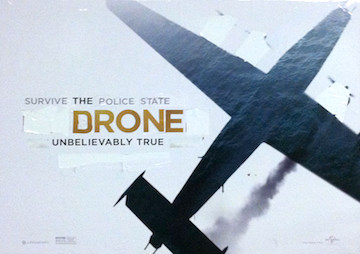In Washington’s Drone Wars, Collateral Damage Comes Home
American drones not only terrorize the populations living under their constant surveillance, they also psychologically wound their own operators, leaving victims with post-traumatic stress disorder on opposite sides of the globe. Poster Boy / CC-BY-2.0
1
2
3
Poster Boy / CC-BY-2.0
1
2
3
Like Heather and Daniel, many of the former drone operators who have gone public are struggling with mental health problems. Some of them are also dealing with substance abuse issues that began as a way to counteract or dull the horrors of the war they were wagomg and witnessing. “We used to call alcohol drone fuel because it kept the program going. Everyone drank. There was a lot of coke, speed, and that sort of thing,” imagery analyst Haas told Rolling Stone. “If the higher ups knew, then they didn’t say anything, but I’m pretty sure they must have known. It was everywhere.”
“Imagine If This Was Happening to Us”
In recent months, something has changed for the whistleblowers. There is a new sense of camaraderie among them, as well as with the lawyers defending them and a growing group of activist supporters. Most unexpectedly, they are hearing from the families of victims of drone strikes, thanks to the work of groups like Reprieve in Great Britain.
In mid-April, for instance, Cian Westmoreland traveled to London and met Malik Jalal, a Pakistani tribal leader who claims that he has been targeted by U.S. drones on multiple occasions. Clive Lewis, a member of Parliament and military veteran, released a photo on Facebook of the historic meeting. “It’s possible that one of the two men I’m [standing] between in this picture, Cian Westmoreland, was trying to kill the man on my right, Malik Jalal — at some stage in the past seven years,” Lewis wrote. “Their story is both amazing and terrifying. At once it shows the growing menace and destructive capability of unchecked political and military power juxtaposed with the power of the human spirit and human solidarity.”
As that sense of solidarity strengthens and as the distance between the former hunters and the hunted begins to narrow, the whistleblowers are beginning to confront some distinctly uncomfortable questions. “We often hear that drones can see everything by day and by night,” a different drone victim of the February 2010 strike in Uruzgan told filmmaker Kennebeck. “You can see the difference between a needle and an ant but not people? We were sitting in the pickup truck, some even on the bed. Did you not see that there were travelers, women and children?”
When the president and his key officials look at the drone program, they undoubtedly don’t “see” women and children. Instead, they are caught up in a Hollywood-style vision of imminent danger from terrorists and of the kind of salvation that a missile launched from thousands of miles away provides. It is undoubtedly thanks to just this thought process, already deeply embedded in the American way of war, that not a single candidate for president in 2016 has rejected the drone program.
That is exactly what the whistleblowers feel needs to change. “I just want people to know that not everybody is a freaking terrorist and we need to just get out of that mindset. And we just need to see these people as people — families, communities, brothers, mothers, and sisters, because that’s who they are,” says Lisa. “Imagine if this was happening to us. Imagine if our children were walking outside of the door and it was a sunny day and they were afraid because they didn’t know if today was the day that something would fall out of the sky and kill someone close to them. How would we feel?”
Pratap Chatterjee, a TomDispatch regular, is executive director of CorpWatch. He is the author of Halliburton’s Army: How A Well-Connected Texas Oil Company Revolutionized the Way America Makes War. His next book, Verax, a graphic novel about whistleblowers and mass surveillance co-authored with Khalil Bendib, will be published by Metropolitan Books in 2017.
[Note: Sonia Kennebeck’s National Bird premieres this month at New York’s Tribeca Film Festival and at the San Francisco Film Festival. It will open in theaters this fall.]
Follow TomDispatch on Twitter and join us on Facebook. Check out the newest Dispatch Book, Nick Turse’s Tomorrow’s Battlefield: U.S. Proxy Wars and Secret Ops in Africa, and Tom Engelhardt’s latest book, Shadow Government: Surveillance, Secret Wars, and a Global Security State in a Single-Superpower World.
Copyright Pratap Chatterjee 2016 Your support matters…Independent journalism is under threat and overshadowed by heavily funded mainstream media.
You can help level the playing field. Become a member.
Your tax-deductible contribution keeps us digging beneath the headlines to give you thought-provoking, investigative reporting and analysis that unearths what's really happening- without compromise.
Give today to support our courageous, independent journalists.






You need to be a supporter to comment.
There are currently no responses to this article.
Be the first to respond.